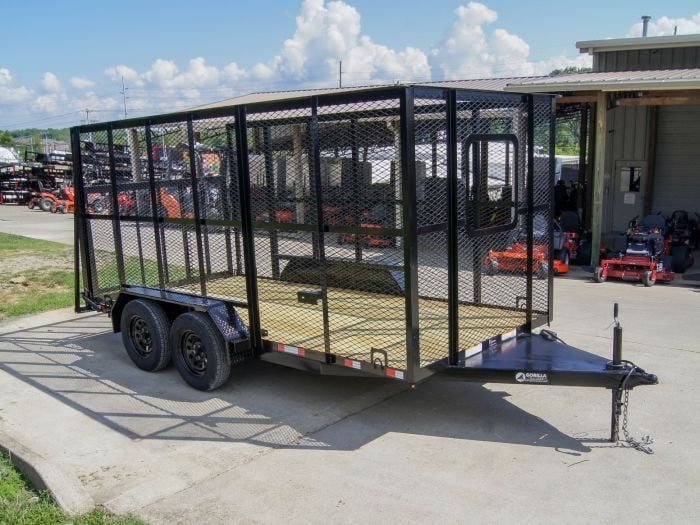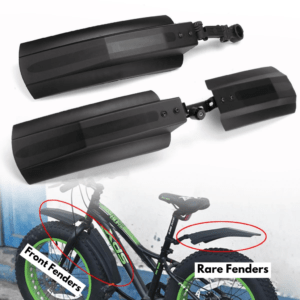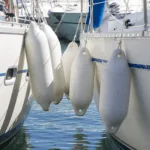Do utility trailers need fenders? If you’ve ever seen a utility trailer flying down the highway, kicking up a cloud of dust, you know it’s not just a nuisance; it’s a safety hazard. That’s where fenders come into play.

What are utility fenders?
Fenders are basically protective shields that cover the wheels of your utility trailer. They’re designed to prevent debris, rocks, and other objects from being flung out and hitting other vehicles or pedestrians. Think of them as your trailer’s armor.
Why are utility fenders important?
In addition to being crucial safety features, fenders are also required by law in most places. So, if you want to avoid a ticket, make sure your trailer is equipped with them.
Moreover, fenders help protect not only you but also other drivers and pedestrians on the road. Imagine a rock flying off your trailer and hitting a cyclist or a pedestrian. It could have serious consequences.
Types of Fenders for Utility Trailers
Different types of fenders for utility trailers
When it comes to fenders for utility trailers, there are several options available. Each type has its own advantages and disadvantages. Here’s a breakdown of the most common types:
1. Plastic Fenders
Plastic fenders are a popular choice for utility trailers due to their light weight and affordability. They are easy to install and can be a good option for those on a budget. However, plastic fenders may not be as durable as metal fenders, especially in harsh conditions.

utility trailer with plastic fenders
2. Metal Fenders
Metal fenders are a more durable option than plastic fenders. They are made from materials such as steel or aluminum, which can withstand heavy impact.
Metal fenders are also longer-lasting and can provide better protection for your trailer. However, they are heavier than plastic fenders, which can affect your trailer’s towing capacity. Click here to see more.

utility trailer with metal fenders
3. Custom Fenders
If you want a unique look for your utility trailer, custom fenders are a great option. Custom fenders can be designed to match your trailer’s style and personality. However, they are more expensive than standard fenders and may require more time to manufacture.

utility trailer with custom fenders
Which type of fender is right for you?
The best type of fender for your utility trailer depends on your specific needs and budget. If you’re looking for a lightweight and affordable option, plastic fenders may be a good choice.
However, if you need a durable fender that can withstand heavy use, metal fenders may be a better option.
If you want a unique look for your trailer, custom fenders are a great way to stand out. However, they can be more expensive and may require more time to manufacture.
How to install fenders
Installing fenders on your utility trailer is a relatively simple task that you can usually do yourself. You’ll need a few basic tools and some time. However, if you’re not comfortable doing it yourself, you can always take your trailer to a mechanic.
DIY Fender Installation
Installing fenders on your utility trailer is a relatively simple task that you can usually do yourself. Here’s a step-by-step guide to help you get started:
1. Gather your tools and materials:
- Drill
- Screwdriver
- Measuring tape
- Marker
- Drill bits
- Screws
- Fenders
2. Prepare the trailer:
Before you begin, clean the area where you’ll be installing the fenders. Remove any existing hardware or obstructions that may interfere with the installation.
3. Position the fenders:
Hold the fenders in place and make sure they are aligned correctly. Use a marker to mark the holes for the screws.
4. Drill the holes:
Drill holes in the marked locations. Make sure the holes are the right size for the screws you’ll be using.
5. Attach the fenders:
Insert the screws into the holes and tighten them securely. Make sure the fenders are firmly attached to the trailer.
6. Test the installation:
Check to make sure the fenders are securely attached and do not move. Test the fenders by driving your trailer around.
Legal Requirements for Utility Trailer Fenders
Are you aware of the legal requirements for utility trailer fenders? It’s important to know the rules to avoid getting a ticket or, worse, causing an accident.
Do I need fenders on my utility trailer?
In general, yes. Most states and countries require utility trailers to have fenders. This is because fenders help prevent accidents and injuries by keeping debris from flying off the trailer and hitting other vehicles or pedestrians.
What are the specific requirements?
The exact requirements for utility trailer fenders can vary depending on your location. However, some common requirements include:
- Number of fenders: You may need a certain number of fenders depending on the size of your trailer.
- Fender size: The fenders must be of a certain size to be effective.
- Fender placement: The fenders must be placed in a specific location on the trailer.

showing the correct placement of fenders on a utility trailer
What happens if I don’t have fenders?
If you’re caught driving a utility trailer without fenders, you could face fines or other penalties. In some cases, you may even be required to have your trailer inspected or repaired before you can drive it again.
Fender Maintenance For Keeping Your Trailer Safe
Once you’ve installed fenders on your utility trailer, it’s important to maintain them properly. Regular maintenance can help ensure that your fenders are in good condition and continue to provide protection for your trailer and others on the road.
Here are some tips for maintaining your utility trailer fenders:
Clean them regularly:
Dirt, grime, and road salt can damage your fenders over time. Therefore, make sure to clean them regularly with a mild detergent and water.
Inspect for damage:
Check your fenders for any signs of damage, such as cracks, dents, or rust. If you find any damage, repair it promptly to prevent further deterioration.
Tighten loose bolts:
Make sure all the bolts and screws that hold your fenders in place are tight. Loose hardware can cause the fenders to shift or come off, which can compromise their effectiveness.
Replace damaged fenders:
If your fenders are severely damaged, it’s important to replace them. Damaged fenders may not provide adequate protection and could pose a safety hazard.
For further details about How to Measure Trailer Fenders for Safety and Efficiency? visit here
Additional Considerations for Utility Trailer Fenders
While fenders are a crucial safety feature for utility trailers, there are additional factors to consider when choosing and using fenders.
Trailer size and load weight:
- Larger trailers: Larger trailers may require more robust fenders to handle heavier loads and debris.
- Heavier loads: Trailers carrying heavy loads may need additional fender protection to prevent damage from flying objects.
Intended use:
- Off-road use: Trailers used for off-road activities may need fenders that can withstand rough terrain and debris.
- Hauling specific materials: Certain materials, such as sharp rocks or heavy logs, may require extra protection from fenders.
Environmental factors:
- Weather conditions: Harsh weather conditions, such as snow, ice, or high winds, can affect the performance of fenders.
- Road conditions: Rough roads can increase the risk of damage to fenders.

Common Fender Myths
There are many myths and misconceptions about utility trailer fenders. Here are a few common ones that need to be debunked:
Myth 1: Fenders are only for looks.
Fact: Fenders are not just for aesthetics. They serve a crucial safety function by preventing debris from flying off your trailer and hitting other vehicles or pedestrians.
Myth 2: Mud flaps are enough.
Fact: Mud flaps can help reduce the amount of mud and debris that is sprayed onto your trailer and other vehicles, but they do not provide the same level of protection as fenders.
Myth 3: Fenders are expensive.
Fact: While custom fenders can be expensive, standard fenders are relatively affordable. The cost of fenders is a small investment compared to the potential costs of an accident.
Myth 4: Fenders can’t be damaged.
Fact: Fenders can be damaged, especially if they are not properly maintained. Regular inspections and maintenance can help prevent damage.
Myth 5: Fenders are difficult to install.
Fact: Installing fenders on your utility trailer is a relatively simple task that can be done by most people. There are also many online resources available to help you with the installation process.
conclusion
fenders are an essential safety feature for utility trailers. They help prevent accidents, injuries, and legal issues. By understanding the different types of fenders, their benefits, and how to properly install and maintain them, you can ensure that your trailer is safe on the road.
Remember:
- Fenders are required by law in most places.
- Fenders protect you, other drivers, and pedestrians.
- Fenders can be a relatively affordable investment.
- Fenders are easy to install and maintain.
Therefore, by investing in fenders for your utility trailer, you’re not just protecting your trailer; you’re also protecting yourself and others on the road.
Frequently Ask Questions (FAQs)
Here are some frequently asked questions about utility trailer fenders:
Can I get a ticket for not having fenders on my utility trailer?
Yes, you can get a ticket for not having fenders on your utility trailer. In most places, it is illegal to operate a utility trailer without fenders.
How much does it cost to install fenders on a utility trailer?
The cost of installing fenders on your utility trailer will vary depending on the type of fenders you choose and the labor costs in your area. However, you can usually expect to pay a few hundred dollars.
Can I use mud flaps instead of fenders?
No, mud flaps cannot be used as a substitute for fenders. Mud flaps can help reduce the amount of mud and debris that is sprayed onto your trailer and other vehicles, but they do not provide the same level of protection as fenders.
What if my trailer is small?
Even small trailers should have fenders. Fenders are important for preventing accidents and injuries, regardless of the size of your trailer.




